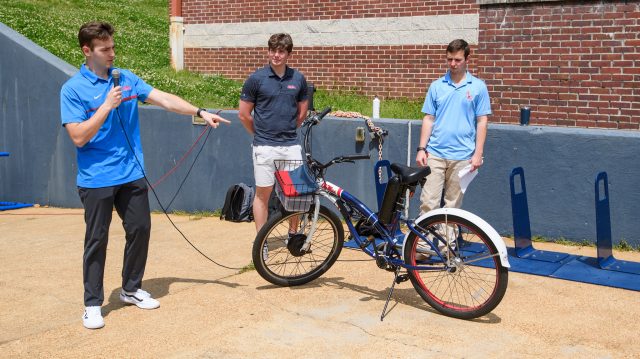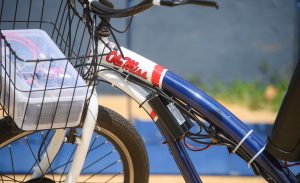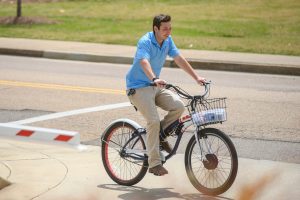
Recent UM engineering graduates (from left) George McAskill, Brent Dalton and Parker Hardy announce their vision of Shark Cycle and demonstrate how the e-bikes operate at their senior design presentation event. Photo by Thomas Graning/Ole Miss Digital Imaging Services
OXFORD, Miss. – Three recent University of Mississippi graduates have developed an electric bike-sharing program in collaboration with multiple university departments to help students, faculty and staff conveniently travel across campus.
The program, dubbed “Shark Cycle,” is a brainchild of Brent Dalton (BSEE 21), of Grenada; Parker Hardy (BSEE 21), of San Antonio; and George McAskill (BSCpE 21), of Marietta, Georgia.
As part of their yearlong capstone project before they graduated, the engineering students formulated the concept as a way to offer easy travel to the campus community, as well as to try to limit the number of vehicles that need to be parked on campus every day.
After discussing the concept and receiving input from various departments across campus, including the Department of Parking and Transportation, the three students set out to create a program that would offer a new means of transportation at UM, enabling students to use electric bicycles at their convenience and implement a more efficient method to move around campus.
“There are too many cars coming to campus,” Hardy said. “We had to figure out a way to offer an alternative form of transportation. We specially chose e-bikes because of Oxford’s hilly terrain and motor assist.”
The university already offers students an opportunity to rent bicycles on campus. However, the apparatus designed by the engineering students transforms a regular bike into an electric bike.

A refurbished bicycle for the Shark Cycle program includes a kit in the front basket that enables users to track and unlock the e-bike for a ride around campus. Photo by Thomas Graning/Ole Miss Digital Imaging Services
Once all equipment is attached to a retrofitted bicycle, the kit provides riders a lighter, more pleasurable trip with the help of motor assistance.
Refurbished bicycles from Rebel Pedals, the traditional bike-sharing program offered on campus, will be retrofitted with the kits to create fully electric bikes that students, faculty and staff can use by scanning a university ID card.
“This team has done a great job,” said Barry Muldrey, assistant professor of electrical and computer engineering, who assigned the project to the students. “They went from zero to functional in a course of practically one semester.
“Technologically, it is very well in the reach of our students to build these from scratch; this proves their ability to operate an internal bike-share system.”
The kit includes a propulsion system made up of an electric motor, battery and controller, as well as a rigorous hardware system with features such as a global positioning system, a radio-frequency identification system reader, and a geofence that is connected to campus Wi-Fi and has a backup long-term evolution, or LTE, system for wireless broadband internet.
These features allow riders to do a number of things including locate the bikes across campus with exact coordinates, use a key to unlock the bicycle, and travel across campus freely and smoothly.
The students initially imagined building sensors to measure the number of vehicles entering and exiting a parking lot, so they worked with officials in Parking and Transportation to collect data and analyzed the results.
“I was interested in the bike-sharing project as soon as the three students reached out,” said Sam Patterson, director of parking and transportation. “We can find an e-bike company like Bird, but the fact that this is home-grown by students for students is a legitimate option for people to use for their everyday transportation.”

Parker Hardy, a recent Ole Miss engineering graduate from Marietta, Georgia, demonstrates how the e-bike operates as he rides along All American Drive on campus. Photo by Thomas Graning/Ole Miss Digital Imaging Services
The students who created the project envision an environment where Ole Miss students might travel to the Oxford campus by bus, then jump on a Shark Cycle and arrive at class within minutes. The goal is to launch the project on campus in the fall 2022 semester.
“One more group of students is going to fine-tune this project this upcoming, next year,” Muldrey said. “This will be an ongoing program that can involve different disciplines of engineering, the Center for Manufacturing Excellence, and be an organization that is mostly student-run to produce these bikes, as well as manage, improve and repair them over time.”